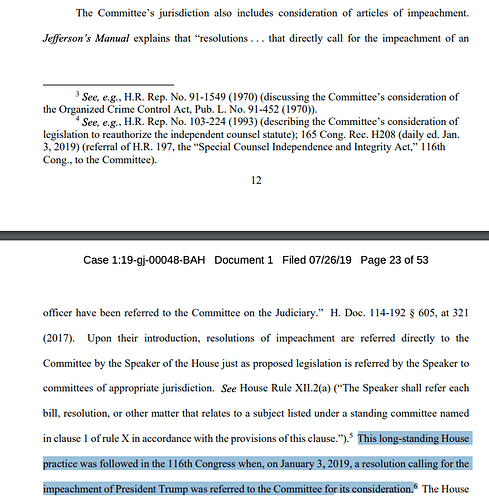The House Intelligence Committee is assisting the House Judiciary Committee in obtaining intelligence materials related to the Judiciary Committee’s impeachment investigation into the President. According to committee rules, the House Intelligence Committee have the ability to de-classify materials and documents, which was successfully tested by Rep. Devin Nunes last year. Lawmakers are hoping the Intel committee’s involvement could temper the courts concerns about grand-jury information being exposed because of their unique ability to handle classified information.
Sources involved in the process say Intelligence Committee Chairman Adam Schiff (D-Calif.) signed off on the panel’s legal strategy and suggested approaches that would closely bind the Judiciary and Intelligence Committees together as the process unfolds. Allegations that Trump welcomed Russian interference in the 2016 election while pursuing a business deal in Moscow have taken center stage for Schiff’s panel.
“In a case as unique as Trump, it is important to consider the totality of the evidence, including classified information,” said a source close to Schiff. “We’ve been working closely with the Judiciary Committee throughout this process and will continue to provide support as needed.”
[…]
Traditionally, an impeachment process has involved the public airing of allegations and evidence against a sitting president. But counterintelligence information, by its nature, is classified and cannot be publicly released or discussed — presenting lawmakers with a new challenge when making the public case for Trump’s ouster.
“The Constitution doesn’t contemplate the notion of having a classified portion of an impeachment process, and it would be political malpractice to try to pursue such a drastic remedy without fully informing the public of the complete factual record,” said Bradley Moss, a prominent national security attorney. “If articles of impeachment are pursued, the House will have to rely upon unclassified information or, as a last resort, use its own Article I authority to disclose otherwise classified information.”
Others noted that the House would have to weigh taking the extraordinary step of revealing classified information if it felt that information contained in secret files were crucial to prove their case.
[…]
The committee has the option to disclose classified information, but it has only been used once in its history: under Nunes’ leadership, when his staff drafted a memo intended to cast doubt on the origins of the investigation of Russia’s links to the Trump campaign. The process, laid out in the House rules, allows lawmakers to reveal classified information if the full House deems it in the public interest, even over the objection of the president. But in Nunes’ case, Trump, over public protests of the FBI, ultimately opted to declassify the material.
Similarly, grand-jury evidence is sensitive and kept secret by law, with few exceptions. The Intelligence Committee is well suited to handle such materials, and its involvement could alleviate concerns about grand-jury information being leaked.
“The Intelligence Committee’s ability to handle high levels of classification — that’s what they’re designed to do. And because of that, what they can do is they can sign in and sign out anyone who needs to review it. They can create a record of who looks at the material,” said Mieke Eoyang, a former subcommittee staff director for the panel, adding: “We don’t people who have a history of dealing with this at a presidential level.”
One former Judiciary Committee official said the Intelligence Committee’s involvement could assuage a court’s concern about how grand jury information would be handled.
"It’s possible, but unproven, that this collaboration may give the legal arguments more jet fuel in the courts for grand jury document access," said Julian Epstein, who was on the Democratic staff of the Judiciary Committee during the Clinton impeachment process.
The Intelligence Committee, which was created as an outgrowth of the Watergate era to police the intelligence community, was never intended as a vehicle for impeachment. The process of drafting articles of impeachment is well outside the panel’s traditional jurisdiction. But in this unique case, Schiff’s committee would review the sensitive grand-jury information related to volume one of Mueller’s report, which details Russia’s interference in the 2016 presidential election.
In addition, the panel could provide Nadler’s staff with documents and testimony gleaned as part of its own probes and its general oversight of the intelligence community. The Intelligence Committee — first under Republican leadership in 2017 and then Democratic leadership this year — conducted dozens of interviews with witnesses connected to the Mueller investigation.



 January 3, 2019
January 3, 2019 


